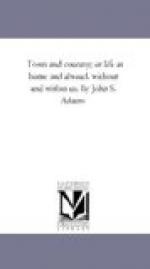Notwithstanding the proverb of “Man, know thyself,” Sansecrat seems to know everything but himself. Thousands of times has it been said that man can see innumerable faults and foibles in his neighbors, but none in himself. Very true; and man can see his own character, just as he can see his own face in a mirror. His own associates mirror forth his own character; and the faults, be they great or small, that he sees in them, are but the true reflection of his own errors. Yet, blind to this, and fondly imagining that he is the very “pink of excellence,” he flatters his own vain feeling with the cherished idea that, while others have faults, he has none, and so slumbers on in the sweet repose of ignorance.
Sansecrat imagines that he knows everything; that to teach him would be like “carrying coals to Newcastle,” or sending ship-loads of ice to Greenland, or furnaces to the coast of Africa; yet he is as ignorant as the greatest dunce, who, parrot-like, repeats that he has heard, without having the least understanding of what he says.
Strange as it may seem, it is nevertheless true that Sansecrat will prosper in the world; for, though destitute of those qualifications which render their possessor worthy of success, he has an abundance of brazen-facedness, with which he will work himself into the good opinion of not a few, who look more closely upon exterior appearance than they do upon inward worth, and judge their fellowmen more by the good quality of their cloth than by the good quality of their hearts, and set more value on a shining hat and an unpatched boot than they do on a brilliant intellect and a noble soul.
PRIDE AND POVERTY.
I cannot brook the proud.
I cannot love
The selfish man; he seems
to have no heart;
And why he lives and moves
upon this earth
Which God has made so fair,
I cannot tell.
He has no soul but that within
his purse,
And all his hopes are centred
on its fate;
That lost, and all is lost.
I knew a man
Who had abundant riches.
He was proud,—
Too oft the effect of riches
when abused,—
His step was haughty, and
his eye glanced at
The honest poor as base intruders
on
The earth he trod and fondly
called his own;
Unwelcome guests at Nature’s
banqueting.
Years
passed away,—that youth became a man;
His beetled brow, his sullen
countenance,
His eye that looked a fiery
command,
Betrayed that his ambition
was to rule.
He smiled not, save in scorn
on humble men,
Whom he would have bow down
and worship him.
Thus with his strength his
pride did grow, until
He did become aristocrat indeed.
The humble beggar, whose loose
rags scarce gave
Protection to him from the
cold north wind,
He scarce would look upon,
and vainly said,
As in his hand he held the




